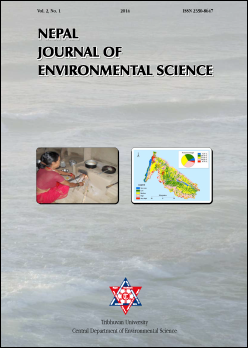Nepal's green economy initiative and framework proposed
DOI:
https://doi.org/10.3126/njes.v2i0.22737Keywords:
Agriculture and forestry, infrastructure and energy, tourismAbstract
Some initiatives on green economy have taken place in Nepal, albeit mainly in the forms of dialogues and seminars on the subject. The National Planning Commission, with support of the Poverty Environment Initiative Programme, has organized a few discussion programmes on the subject in recent years. Different non-governmental organizations and the private sector have also organized dialogues on the subject. Among others, these dialogues and seminars have helped spur the debate on what a green economy means for Nepal, which are the sectors that could potentially contribute to a green economy and hence need to be promoted, and what roles different stakeholders should play in Nepal’s pursuit of a green economy. Majority of the people living in Nepal are dependent on agriculture and forestry for their livelihoods. These sectors have not contributed much to greenhouse gas (GHG) emissions. The state of industrial development in the country has not been to the desired extent, and therefore, GHG emissions thereof are very minimal. That is not to say, however, that Nepal is free of environment-related problems. Environmental degradation has been ever increasing; urban population is constantly on the rise and environmental problems are rising commensurately; modern agriculture and unsustainable forestry management practices in many cases are adding to environmental woes; among others. Given that the world is increasingly resorting to a green economy path, Nepal needs to adopt green economy policies to be competitive in the world market. Hence, there is a need to have organized structures to steer the debate on green economy approaches that are applicable in the Nepalese context. Many sectors in Nepal, such as agriculture and forestry, are already green. Moreover, Nepal is yet to enter into the industrialization phase. Therefore, it is relatively easier for the country to take a greener approach to industrialization and development than for many other countries that need to revisit their traditional approach. Nepal can take the initiative of going green by focusing first on three major sectors: agriculture and forestry; infrastructure and energy; and tourism.
Downloads
Downloads
Published
How to Cite
Issue
Section
License
This license enables reusers to distribute, remix, adapt, and build upon the material in any medium or format for noncommercial purposes only, and only so long as attribution is given to the creator.

